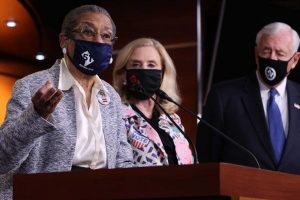DC statehood bill passes House for second time, legislation moves to split Senate

WASHINGTON – The Democratic-led House of Representatives again passed legislation Thursday that would make Washington, D.C., the 51st state – something residents and leaders in the nation’s capital have been requesting for decades.
The bill passed 216-208.
But the Washington, D.C. Admission Act faces slim chances of advancing in the split Senate, where it would need Republican support to overcome a legislative hurdle known as the filibuster. Without at least 10 Senate Republican votes joining all 50 Democrats and independents, the legislation will not make it to President Joe Biden’s desk
The bill, introduced by Del. Eleanor Holmes Norton, D-D.C., passed the House in the last Congress, though it was not given a vote in the then-Republican-majority Senate. The 2020 passage in the House marked the first time a D.C. statehood bill passed in either chamber of Congress.
House Speaker Nancy Pelosi, D-Calif., speaking at a press conference Wednesday and donning a mask with the number “51” on it, said, “Our founders built our democracy on a simple promise that every American should have a voice in our government: from City Hall, to the halls of Congress. Washingtonians…. pay taxes, fight in our wars, contribute to the economic life of our country. But for centuries, they have been denied their right to representation.”
“Taxation without representation” is on Washington license plates because residents pay taxes but are not represented with a vote in Congress, Pelosi noted.
Residents can vote in presidential elections. Norton is Washington’s sole congressional delegate, a position that allows her to draft legislation but not vote, according to the city’s government.
Del. Eleanor Holmes Norton, D-D.C., speaks during a news conference about statehood for the District of Columbia with Rep. Carolyn Maloney, D-N.Y., and House Majority Leader Steny Hoyer, D-Md., at the U.S. Capitol on Wednesday. (Photo: Chip Somodevilla, Getty Images)
With H.R. 51, Pelosi continued, “Congress is taking a significant step to enfranchise the people of D.C. with power to participate fully in our democracy.”
Democrats, supporters of the legislation and Washington Mayor Muriel Bowser have argued that statehood for Washington, a city with a large Black population, is a civil-rights issue. Supporters say statehood is necessary because the residents are disenfranchised with the lack of representation in Congress.
Census Bureau data shows that 46% of the district’s population is African American, 11% is Hispanic or Latino and 4% is Asian.
But Republicans argue the population size of Washington makes it too small to be a state.
Rep. Nancy Mace, R-S.C., recently claimed that Washington “wouldn’t even qualify as a singular congressional district,” and that should disqualify it from gaining statehood. She said so while Rep. Liz Cheney, a Republican who represents Wyoming, stood behind her.
Washington, D.C., with a population of around 700,000, is bigger than Wyoming and Vermont in terms of population, according to the most recent Census data.
Republicans have also accused Democrats of seeking statehood for political gain, as residents in the District tend to lean toward that party politically. Since 2000, according to the Brookings Institute, the Democratic presidential nominee has captured over 89% of the vote in Washington, D.C.
Under the bill, the state would be represented by two senators, like all other states, and one member of the House of Representatives. The number of representatives a state has is based on population. Vermont, Delaware, Wyoming, Alaska, North Dakota, South Dakota and Montana each have one representative.
Republicans have long insisted those senators would be Democrats.
“They plan to make the District of Columbia a state – that’d give them two new Democratic senators – Puerto Rico a state, that would give them two more new Democratic senators,” McConnell said in an interview with Fox News’ Laura Ingraham last year. “So this is full bore socialism on the march in the House.”
Senate Majority Leader Chuck Schumer, D-N.Y., speaking from the Senate floor Thursday, said arguments against Washington, D.C., statehood are rooted in bigotry.
“The debate over D.C. Statehood has taken a rather dark turn,” he said. “Some of my colleagues on the other side, rather than fashion any argument on the merits, have taken to denigrating the base worth of residents of the District of Columbia.”
Ahead of the vote Thursday, House Minority Leader Kevin McCarthy, R-Calif., called Washington, D.C., statehood a “scheme” hinged on “consolidating power and enacting radical policies.”
Opinions are still mixed on whether Washington D.C.'s 712,000 residents should be granted full citizenship. D.C. Shadow Sen. Paul Strauss and Cato Institute's Roger Pilon breakdown the different viewpoints. (March 23)
AP Domestic
Source: Read Full Article

